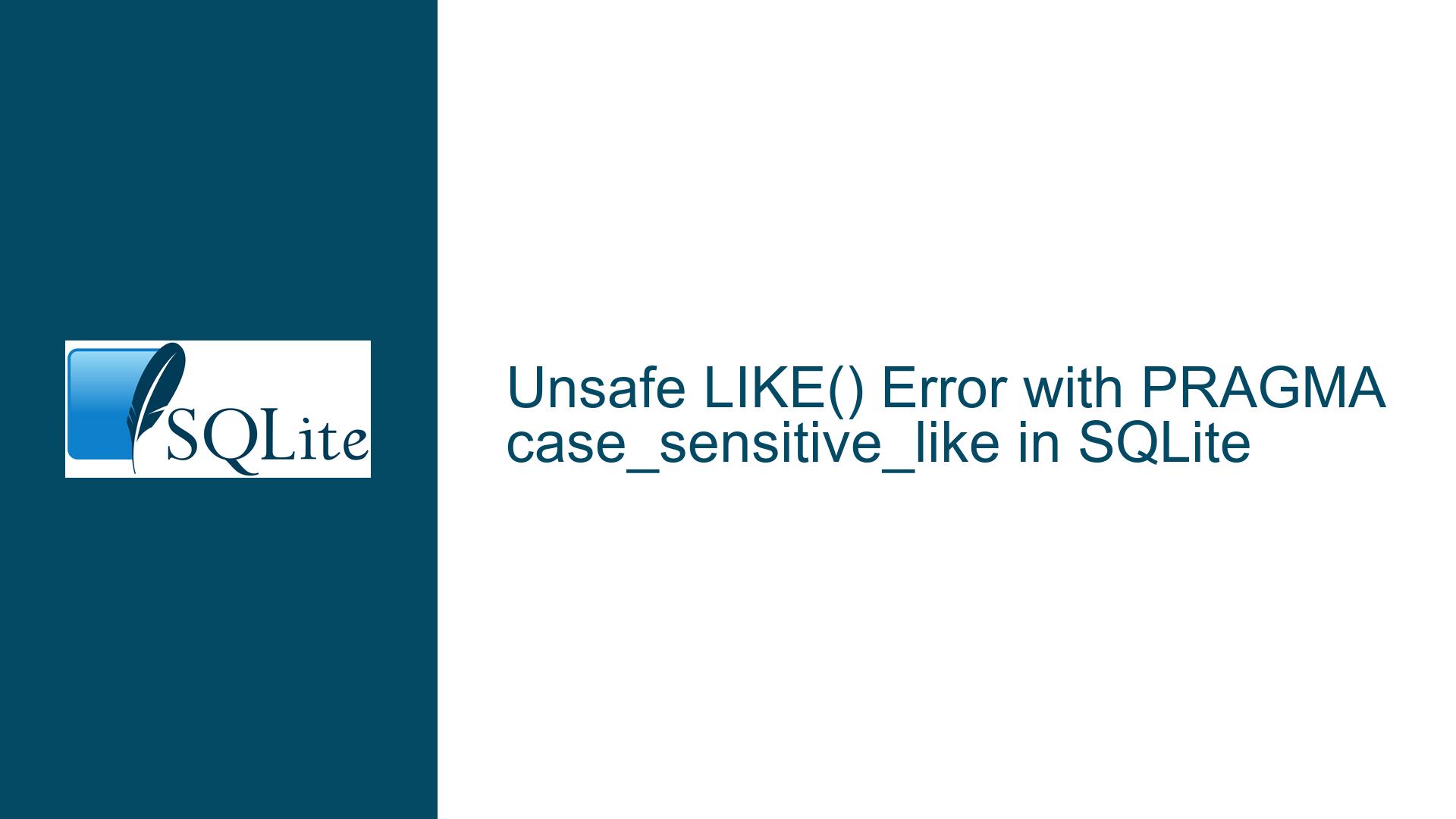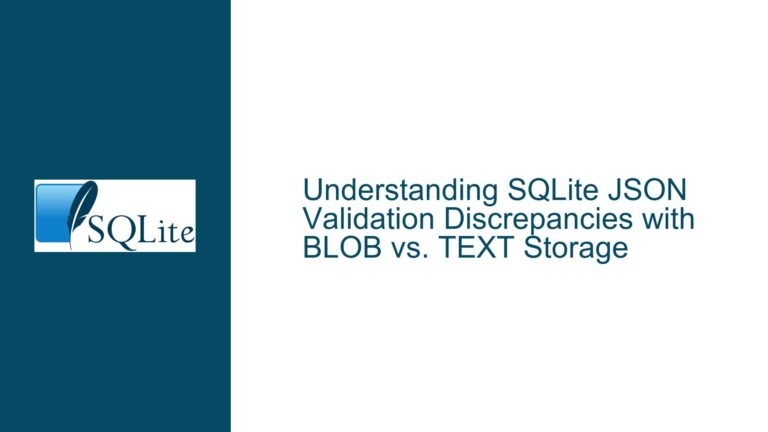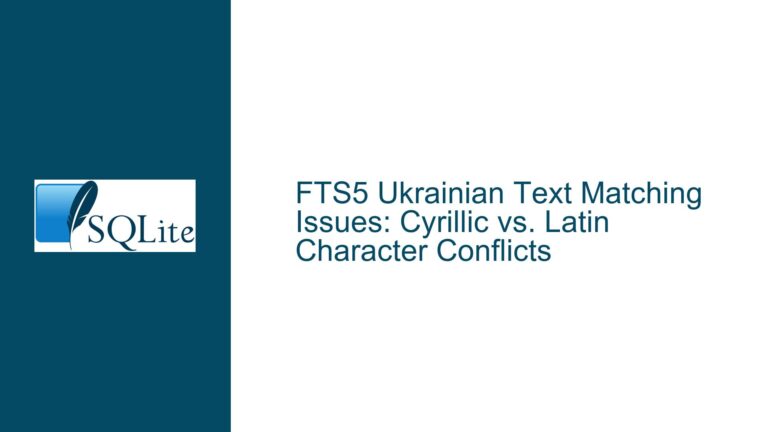Unsafe LIKE() Error with PRAGMA case_sensitive_like in SQLite
Understanding the Behavior of PRAGMA case_sensitive_like and LIKE() Function
The issue at hand revolves around the unexpected behavior of the LIKE function in SQLite when the PRAGMA case_sensitive_like setting is modified. Specifically, setting PRAGMA case_sensitive_like to either True or False results in an "unsafe use of LIKE()" error when the LIKE function is used in certain contexts, such as within a view definition. This behavior is counterintuitive because the default value of PRAGMA case_sensitive_like is False, and one would expect that explicitly setting it to False would not alter the behavior of the LIKE function. Furthermore, the error persists even when PRAGMA trusted_schema is not disabled, raising questions about why the LIKE function is deemed unsafe in this scenario.
To fully grasp the issue, it is essential to understand the role of PRAGMA case_sensitive_like in SQLite. This pragma controls whether the LIKE operator performs case-sensitive or case-insensitive comparisons. By default, LIKE is case-insensitive, meaning that 'abc' LIKE 'A%' would evaluate to True. However, when PRAGMA case_sensitive_like is set to True, the LIKE operator becomes case-sensitive, so 'abc' LIKE 'A%' would evaluate to False. The unexpected behavior arises when this pragma is set, even to its default value, and the LIKE function is used in a view or other contexts where SQLite enforces safety checks.
The core of the problem lies in how SQLite handles the LIKE function internally when PRAGMA case_sensitive_like is modified. When this pragma is set, SQLite replaces the default LIKE function with an application-defined version that respects the case sensitivity setting. This replacement function is marked as SQLITE_FUNC_UNSAFE, which triggers SQLite’s safety mechanisms when the function is used in contexts that require trusted schema operations, such as view definitions. This marking is the root cause of the "unsafe use of LIKE()" error.
Exploring the Causes of the Unsafe LIKE() Error
The "unsafe use of LIKE()" error occurs due to a combination of factors related to SQLite’s internal handling of the LIKE function and its safety mechanisms. The primary causes can be broken down into three key areas: the behavior of PRAGMA case_sensitive_like, the marking of the replacement LIKE function as unsafe, and the interaction with SQLite’s trusted schema system.
First, the behavior of PRAGMA case_sensitive_like is central to the issue. When this pragma is set, SQLite replaces the default LIKE function with a custom implementation that respects the case sensitivity setting. This replacement function is necessary because the default LIKE function does not support dynamic case sensitivity. However, this replacement function is marked as SQLITE_FUNC_UNSAFE, which indicates that it may have side effects or behave unpredictably in certain contexts. This marking is a precautionary measure to prevent potential security vulnerabilities or data integrity issues.
Second, the marking of the replacement LIKE function as unsafe is a deliberate design choice in SQLite. Functions marked as SQLITE_FUNC_UNSAFE are restricted from being used in contexts that require trusted schema operations, such as view definitions, triggers, or indexed expressions. This restriction is intended to prevent malicious or poorly designed functions from compromising the integrity of the database. However, in the case of the LIKE function, this marking is overly restrictive, as the function is not inherently unsafe. The error arises because SQLite’s safety mechanisms do not distinguish between genuinely unsafe functions and functions like LIKE that are safe but have been marked as unsafe due to their dynamic behavior.
Third, the interaction with SQLite’s trusted schema system plays a role in the issue. The trusted schema system is designed to prevent untrusted code from modifying the database schema or executing potentially harmful operations. When PRAGMA trusted_schema is enabled, SQLite enforces additional safety checks on functions used in schema operations. The replacement LIKE function, being marked as unsafe, fails these checks, resulting in the "unsafe use of LIKE()" error. This behavior persists even when PRAGMA trusted_schema is not explicitly disabled, as the replacement function is inherently marked as unsafe.
Resolving the Unsafe LIKE() Error and Best Practices
To resolve the "unsafe use of LIKE()" error, it is necessary to address the underlying causes of the issue. This involves modifying the behavior of the replacement LIKE function, adjusting SQLite’s safety mechanisms, or adopting alternative approaches to achieve the desired functionality. Below are detailed troubleshooting steps, solutions, and fixes for the issue.
Modifying the Replacement LIKE Function
One approach to resolving the issue is to modify the replacement LIKE function so that it is no longer marked as unsafe. This can be achieved by setting the SQLITE_INNOCUOUS flag when registering the function. The SQLITE_INNOCUOUS flag indicates that the function is harmless and does not have any side effects, making it safe for use in trusted schema operations. By setting this flag, the replacement LIKE function can be used in views and other schema operations without triggering the "unsafe use of LIKE()" error.
To implement this solution, the SQLite source code must be modified to include the SQLITE_INNOCUOUS flag when registering the replacement LIKE function. This change ensures that the function is treated as safe by SQLite’s safety mechanisms, allowing it to be used in all contexts without restrictions. This approach has been implemented in a recent commit to the SQLite source code, which resolves the issue by marking the replacement LIKE function as innocuous.
Adjusting SQLite’s Safety Mechanisms
Another approach is to adjust SQLite’s safety mechanisms to better handle functions like the replacement LIKE function. This could involve introducing a new flag or modifying the existing SQLITE_FUNC_UNSAFE flag to distinguish between genuinely unsafe functions and functions that are safe but have dynamic behavior. By making this distinction, SQLite can allow safe functions to be used in trusted schema operations while still preventing unsafe functions from compromising the database.
Implementing this solution would require changes to the SQLite source code to introduce the new flag or modify the existing flag. This approach would provide a more flexible and nuanced safety system, allowing developers to use functions like the replacement LIKE function without encountering unnecessary restrictions. However, this solution would require careful consideration and testing to ensure that it does not introduce new security vulnerabilities or compromise the integrity of the database.
Alternative Approaches to Case Sensitivity
If modifying the SQLite source code is not feasible, an alternative approach is to achieve case sensitivity without using PRAGMA case_sensitive_like. This can be done by using explicit case conversion functions, such as LOWER() or UPPER(), in conjunction with the LIKE operator. For example, instead of relying on PRAGMA case_sensitive_like, you can write queries like the following:
SELECT * FROM table WHERE LOWER(column) LIKE LOWER('a%');
This approach ensures that the comparison is case-insensitive without requiring the use of PRAGMA case_sensitive_like. While this method may require more verbose queries, it avoids the issues associated with the replacement LIKE function and ensures compatibility with SQLite’s safety mechanisms.
Best Practices for Using PRAGMA case_sensitive_like
To avoid encountering the "unsafe use of LIKE()" error, it is important to follow best practices when using PRAGMA case_sensitive_like. These best practices include:
Avoid Setting PRAGMA case_sensitive_like Unnecessarily: Since the default value of
PRAGMA case_sensitive_likeisFalse, there is no need to explicitly set it toFalseunless you have previously set it toTrue. Avoid modifying this pragma unless absolutely necessary.Use Alternative Methods for Case Sensitivity: As mentioned earlier, consider using explicit case conversion functions instead of relying on
PRAGMA case_sensitive_like. This approach ensures compatibility with SQLite’s safety mechanisms and avoids potential issues with the replacementLIKEfunction.Test Queries Thoroughly: When using
PRAGMA case_sensitive_like, thoroughly test your queries to ensure that they behave as expected and do not trigger safety errors. Pay special attention to queries used in views, triggers, and indexed expressions, as these contexts are more likely to enforce safety checks.Stay Updated with SQLite Releases: The issue with the replacement
LIKEfunction has been addressed in a recent commit to the SQLite source code. Stay updated with new SQLite releases to benefit from this and other improvements. If possible, use a version of SQLite that includes the fix for this issue.
By following these best practices, you can minimize the risk of encountering the "unsafe use of LIKE()" error and ensure that your SQLite databases operate smoothly and securely.
In conclusion, the "unsafe use of LIKE()" error in SQLite is a nuanced issue that arises from the interaction between PRAGMA case_sensitive_like, the replacement LIKE function, and SQLite’s safety mechanisms. By understanding the underlying causes and adopting appropriate solutions and best practices, you can resolve the issue and avoid similar problems in the future. Whether through modifying the SQLite source code, adjusting safety mechanisms, or using alternative approaches to case sensitivity, there are multiple ways to address this issue and ensure the reliable operation of your SQLite databases.






